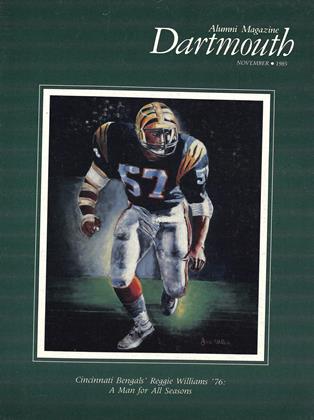FALWELL: BEFORE THE MILLENIUM,A CRITICAL BIOGRAPHY
by Dinesh D'Souza '83Regnery Gateway, 1984205 pp., $14.00
First, credit where it's due: One aspect of this book is better than you might expect from a writer who formerly edited The Dartmouth Review and currently edits Prospect, the magazine of a splinter alumni group at Princeton, both publications on occasion catering to the nasty side of human feelings.
Falwell is good in a journalistic sense; a profile of a life. D'Souza devotes the opening chapter to "A Day in the Life" of Falwell and a later one to his subject at work at the Thomas Road Baptist Church. He provides vivid snapshots, a personality come alive.
Curiosity, D'Souza tells us, drove him to examine Falwell - curiosity about the man pilloried by, among many others, A. Bartlett Giamatti, president of Yale, and Sen. Barry Goldwater, who said, "Every good American ought to kick Falwell in the ass." D'Souza concludes, "Jerry Falwell matters." Then he noticed the "giant contradiction" of Falwell's life, defined by D'Souza as "other-worldly" faith and "here-and-now" politics, in which Falwell could be militant or divisive or warm or ironic or traditional or reckless, a melange worth looking into.
This is an intelligent, intriguing beginning to what D'Souza calls a "critical" biography. But the implicit promise of explaining the contradiction is not kept. "His theological style has been to identify two sides, good and evil, in every dispute. Naturally he has extended this style to politics," writes D'Souza. But the biographer does not explore this rigid manner of thinking. Falwell even gave D'Souza an opening: " 'One thing about politics,' Falwell once told me, 'is that you're not always sure you're doing the right thing.' "
On another occasion, D'Souza observes, "One has only to talk to Falwell for a few minutes to detect that the issue of sex is a primary one. Why it should be so is not clear." Shouldn't D'Souza make clear to himself, and then to the readers, why the issue has such primacy for Falwell?
D'Souza does not seem to understand enough about psychology or sociology or history to answer the deeper questions. He sketches the history of fundamentalism but how it gives rise to Falwell is not indicated. He suggests that a "major split" in American fundamentalism could occur, but this dwindles into a tussle between Falwell and the Rev. Bob Jones, nothing much to portend a cataclysm.
What is more objectionable is that the "critical biography" veers toward an essay by D'Souza. He mentions Falwell's comfortable house, and rather than letting Falwell defend his well-off syle, takes on the task himself by inviting us to compare it to the way the Rev. Jesse Jackson or Mike Wallace lives. We have to endure D'Souza's arguments for the Moral Majority, not Falwell's: "Here again Moral Majority is wrongly characterized as fundamentalist," he concludes, instead of letting Falwell speak.
And then the essay becomes cuteness: "Liberals admit that, ahem, it . . Or a large brush: "Liberals have always denied . . . First they said . . . Then they said . . . Next they said . . . Finally the liberals announced ..." (This, when D'Souza tells us that fundamentalists dislike such sweeping statements applied to themselves.) Or selfserving: H. L. Mencken was "a newspaper comedian who aspired to be acclaimed an intellectual" but Sen. Joseph McCarthy merely "tended to exaggerate"; name-calling by Falwell's enemies is "invective," but when Falwell retaliates in kind, he is "adept at names."
D'Souza likes to twit the Ivy League. He cites from the catalogue of Liberty Baptist College, founded by Falwell in 1971, a passage borrowed from the charter of Harvard, drawn up in 1646: "Everyone shall consider the main end of life and studies to know God and Jesus Christ which is eternal life."
Then D'Souza observes, "That tradition continues strong at L.8.C., even though Harvard has long since abandoned it." Yet for Falwell, D'Souza asks for objectivity. He quotes one observer as saying, "We blind ourselves by the caricatures we use in order to dismiss them." For the sake of a joke or to score a point, however, D'Souza prefers the blinders.
Marshall Ledger '61
Ledger is associate editor of The Pennsylvania Gazette, the alumni magazine of the Universityof Pennsylvania.
 View Full Issue
View Full Issue
More From This Issue
-
 Cover Story
Cover StoryA Man for All Seasons
November 1985 By Douglas McCreary Greenwood '66 -
 Feature
Feature"Shakespeare in Sable"
November 1985 By Errol Hill -
 Feature
FeaturePolitics in an electronic age
November 1985 By Jim Newton '85 -
 Article
ArticleConnie Lambert: Doyenne of "The Daily D"
November 1985 By Georgia Croft -
 Class Notes
Class Notes1978
November 1985 By Catherine A. Gates -
 Sports
SportsTough days on the gridiron
November 1985
Mark Woodward '72
-
 Books
BooksDartmouth Authors
MAY 1985 By Mark Woodward '72 -
 Books
BooksKHANS AND SHAHS: A DOCUMENTARY ANALYSIS OF THE BAKHTIYARI IN IRAN
SEPTEMBER 1985 By Mark Woodward '72 -
 Books
BooksDartmouth Authors
OCTOBER 1985 By Mark Woodward '72 -
 Books
BooksAn Intriguing Account
NOVEMBER • 1985 By Mark Woodward '72 -
 Books
BooksMaintaining a United Front
NOVEMBER • 1985 By Mark Woodward '72 -
 Books
BooksDartmouth Authors
NOVEMBER • 1985 By Mark Woodward '72
Books
-
 Books
BooksMAUD
January 1940 -
 Books
BooksFAMILY ARK.
JANUARY 1967 By CHARLES E. BREED '51 -
 Books
BooksFarmers and Workers in American Politics
March 1925 By Erville B. Woods -
 Books
BooksMODERN BOOK COLLECTING FOR THE IMPECUNIOUS AMATEUR
October 1936 By Harold Goddard Rugg '06 -
 Books
BooksLEAF, FRUIT AND FLOWER, A NATURE PRIMER and LET'S LEARN THE FLOWERS
February 1949 By Harold Rugg '06 -
 Books
BooksGEOLOGY OF VICTORIA ISLAND AND ADJACENT REGIONS,
February 1948 By J. W. Goldthwait.


